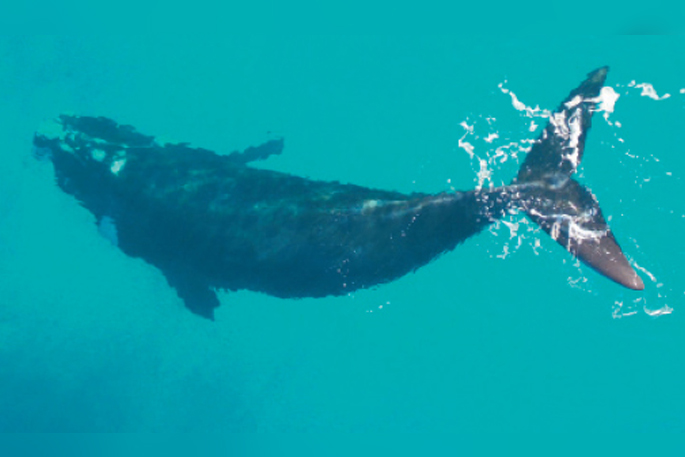Whale watchers can now follow the summer travels of six New Zealand southern right whales online, thanks to scientists successfully attaching satellite tracking tags to the tohora in August.
As part of a major research project involving the University of Auckland and Cawthron Institute, the researchers worked in freezing conditions in the sub-Antarctic where tohora gather each winter in the sheltered harbour of Port Ross on Auckland Island, which serves as a nursery and socialising destination.
And winter 2020’s gathering provided scientists with the opportunity to attach the tracking tags and do other research including taking skin samples for genetic and biochemical analysis and to measure the size of individual whales using drone technology.
Defying predictions
The expedition to Port Ross, which lies more than 400km south of Stewart Island in the Southern Ocean, aimed to find out more about the migration routes and offshore feeding grounds of this population of whales.
Early results from the satellite tracking shows the whales – named Tahi, Rua, Toru, Wha, Rima and Bill/Wiremu – already leaving Port Ross for the summer but so far they have defied predictions of where they might head to.
Dr Emma Carroll, a Royal Society of New Zealand Te Aparangi Rutherford Discovery Fellow at the University of Auckland, say her team had expected they would travel north to the warmer waters nearer New Zealand and Australia “where we assume their traditional feeding grounds are”.
“But first they swam even further south towards Antarctica. They also initially spent longer in the general region of the Auckland Islands than we thought they would, so that’s a clear indication of just how important this area is to these amazing animals.”
Population recovery
As of November, one of the whales, named Toru, was about 1300km east of Bill, south of South Australia, probably also in the subtropical convergence.
“Toru is closer to where two whales tracked offshore, in a pilot study, from the Auckland Islands in 2009 went to feed,” says Emma.
“So three whales with regularly transmitting tags – Toru, Bill and Tahi – seem to have reached their feeding grounds, likely in the subtropical convergence south of Australia.
“It will be really interesting to see where they go next. Maybe they’ll keep feeding there all summer, maybe they’ll move south – we’ll have to wait and see!”
Whales found refuge in the Auckland Islands while around mainland New Zealand whaling nearly wiped them out in the early-1800s. Today, the Port Ross region is still the only nursery area for tohora in New Zealand waters, and the whales have been protected by a moratorium on tourism since 2002.
Emma says the winter 2020 expedition of eight scientists into the wild Southern Ocean aboard the yacht Evohe posed some major challenges. “It was freezing cold with snow and sleet, so working in those conditions is really hard but we went prepared. Sailing into Port Ross and seeing so many whales was a wonderful moment.”
Cawthron Institute marine ecologist Dr Simon Childerhouse, who was also involved in the expedition, says this particular population of tohora have recovered well from whaling from the early-1800s when numbers plummeted to as low as 40 from an estimated 30,000.
Changing climate
By 2009, the population had recovered to around 2000 whales. But one of the biggest potential remaining threats to tohora is climate change and the effect it might be having on marine species the whales rely on for food once they reach summer feeding grounds.
“Other populations in the Southern Hemisphere are not faring that well and there is ongoing concern about how climate change may be affecting the amount of food available to them,” says Simon.
“We need to do more to whether these impacts have had the same effect on New Zealand’s population to date, and learn from what has happened elsewhere so that we can protect New Zealand’s tohora now and in the future.”
The research is made possible by private equity leader, philanthropist and New Zealand proprietor Brian Sheth, the Royal Society of New Zealand Te Aparangi, the University of Auckland, Live Ocean and the Lou & Iris Fisher Charitable Trust.
Follow the voyages of the whales at: www.tohoravoyages.ac.nz and www.liveocean.com



0 Comments
Leave a Comment